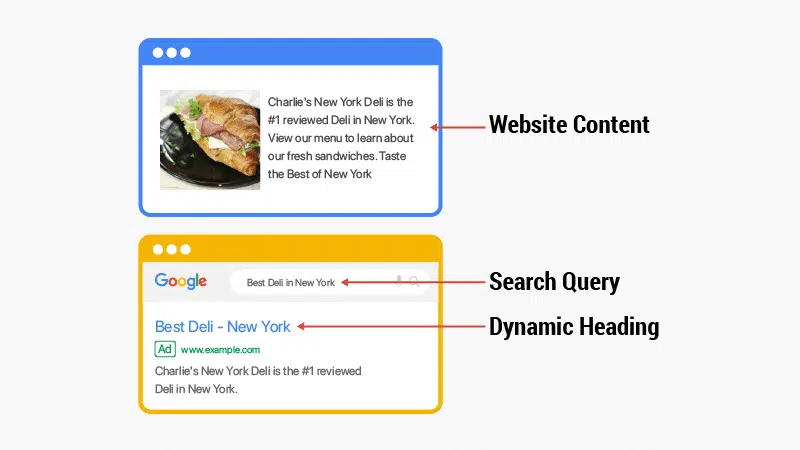What are Dynamic Search Ads?
There are customers searching for what you offer on Google. If your website is regularly creating new content or adding new inventory, it can be time-consuming to try to keep your ads relevant. Dynamic Search Ads (DSA) are the easiest way to find customers searching for what you have to offer. Ideal for advertisers with a well-developed website or a large inventory, a Dynamic Search Ad utilizes the content of your website to create a targeted ad consisting of a distinct headline and an applicable landing page. A DSA will show based on Google’s crawl of the content on your website as opposed to the keywords you are targeting. Even if you have the most targeted keywords, it’s likely that you’re not covering every relevant search term that a potential customer searches. Should your business not use Dynamic Search Ads, you may miss out on reaching valuable customers whose unique search queries differ from what your business typically targets.
How a Dynamic Search Ad is Created
Let’s say you are the owner of a prominent deli in New York called Charlie’s New York Deli. If an individual searches Google for “best deli New York,” Google will recognize the titles and keyword phrases on your website relating to being voted the best deli in New York and generate an ad with the headline “Best Deli – New York.” Should the individual choose to click on the ad generated by Google, the user would then be directed to a landing page from your website that Google selected consisting of reviews and accolades that support your business being the best deli in New York.

The Benefits of Dynamic Search Ads
From automatically updating your ads to automatically generating headlines, DSAs are easy to set-up, will save you time, and keep your ads relevant and effective.
Save Time: Dynamic Search Ads do not require keyword research and targeting, which each take a significant amount of time and effort.
Easy Set-Up: DSA campaigns require you to only create descriptions relating to your business since the ad’s headline is automatically generated by Google.
Automate Updates: Should you make changes to your website, Google automatically accounts for these changes in its Dynamic Search Ads.
Lower CPCs: Dynamic Search Ads tend to drive more traffic at a cheaper cost than a standard ad. If your business does its part in ensuring that this is high-quality traffic and that potential customers are being directed to appropriate landing pages, your business could benefit from the increased traffic from a DSA campaign.
What You Need to Know Before Creating a DSA Campaign
Targeting: When setting up Dynamic Search Ads, your business needs to consider the structure of your website. Dynamic Search Ads could be targeted using landing pages from your standard ad groups, categories of website content based on themes, or specific pages from your website.
The Importance of Negative Keywords: A DSA campaign could drive a lot of traffic to your website. However, you need to add a group of negative keywords to the campaign and continually add to this list based on search term queries to ensure that the traffic is relevant to your business.
Loss of Control: By running a DSA campaign, your business loses control over which queries your ads are served to by not utilizing keywords. Your business thus needs to frequently monitor search terms queries that prompt your ad appearing to a Google searcher. Just like with traditional search ads, irrelevant queries can waste your budget quickly.
Getting Started with Dynamic Search Ads
If done correctly, Dynamic Search Ads are great for supplementing text ads of your business. By using a DSA campaign as part of your Google Advertising efforts, you can discover searches that your current keywords do not cover, increase traffic to your website, and portray ads with headlines that are optimally relevant to a user’s search query.
If you have a large business with a lot of products and landing pages on your website, creating Dynamic Search Ads may be easier than creating manual ads for every product. If these products and inventory are constantly changing, Google is able to regularly crawl your website and display Dynamic Search Ads only for products that are in stock. If you have a smaller business, Dynamic Search Ads may not be necessary on a long-term basis. However, they can still be useful short-term in terms of driving traffic to your site, discovering keywords you may be overlooking, and increasing brand awareness.
If you are looking to drive quality traffic to your website with Dynamic Search Ads, contact us at Today’s Business and we’ll help get you started!